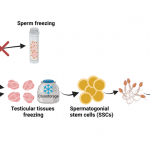Polycystic ovary syndrome (PCOS) is the most common endocrine disorder in reproductive-aged women and is the leading cause of infertility.
 We sat down with Dr. Marie Menke, assistant professor of obstetrics, gynecology and reproductive sciences at the University of Pittsburgh School of Medicine and UPMC Magee-Womens Hospital, and asked her to provide some insights about this serious disorder that affects millions of American women.
We sat down with Dr. Marie Menke, assistant professor of obstetrics, gynecology and reproductive sciences at the University of Pittsburgh School of Medicine and UPMC Magee-Womens Hospital, and asked her to provide some insights about this serious disorder that affects millions of American women.
What is PCOS?
A. PCOS is diagnosed primarily by clinical symptoms. If a woman is experiencing two of the three following characteristics, she may have PCOS: An irregular menstrual cycle, hair growth in a male pattern fashion – excess hair on the upper lip, chest, belly and/or back – and/or cysts on the ovaries.
What does it mean if you are diagnosed with PCOS?
A. Being diagnosed with PCOS is a long journey, and while we have a lot of treatment options and we’ve come a long way in treating symptoms, it can still be frustrating. It takes a while to be diagnosed with PCOS and it doesn’t immediately go away. I advise my patients to set long-term goals, which makes having the disorder a little more manageable. For example, it is possible to get pregnant with PCOS, but it might take a little longer.
Are there side effects of PCOS?
A. There are several health problems that are associated with PCOS, such as type 2 diabetes, high blood pressure and weight gain. Some women struggle with the physical symptoms of PCOS, such as hair growth and weight gain. It’s important for women to tell their doctor if PCOS symptoms are concerning and bothersome.
What is the usual treatment for women with PCOS?
A. When a patient walks into Magee with PCOS, we first talk about what her main concern is. If she is concerned about irregular periods or hair growth, our first line of therapy is typically birth control pills. Infertility rates are very high for women with PCOS because they are not ovulating regularly or frequently. If a woman is concerned about getting pregnant, we can provide oral pills to help with ovulation. Approximately 50 to 60 percent of women ovulate within five or six tries with medication. If this doesn’t work, we have other options for women, such as in vitro fertilization, or IVF.
If you are a woman and are experiencing some of the symptoms of PCOS, what should you do?
A. It’s important for women to talk with their doctor or OBGYN to find what’s best for them because there are a number of different treatment options available for this disorder.
For more information about UPMC services, call Magee’s Center for Fertility & Reproductive Endocrinology at 412-641-1600.








